Did you get a message saying your Facebook page will be deleted? This is a scam trying to steal your login information. Its goal is to trick you into giving away your credentials.
⚠️ Here’s what happens: The scam message, supposedly from a “temporary support agent at Facebook”, claims your page violated trademark rights and will be deleted. It includes a link, like “case-93614712.help-desk-information.com”, which looks official. But this link leads to a fake website designed to capture your Facebook login details. You shouldn’t click on these links or enter any information.
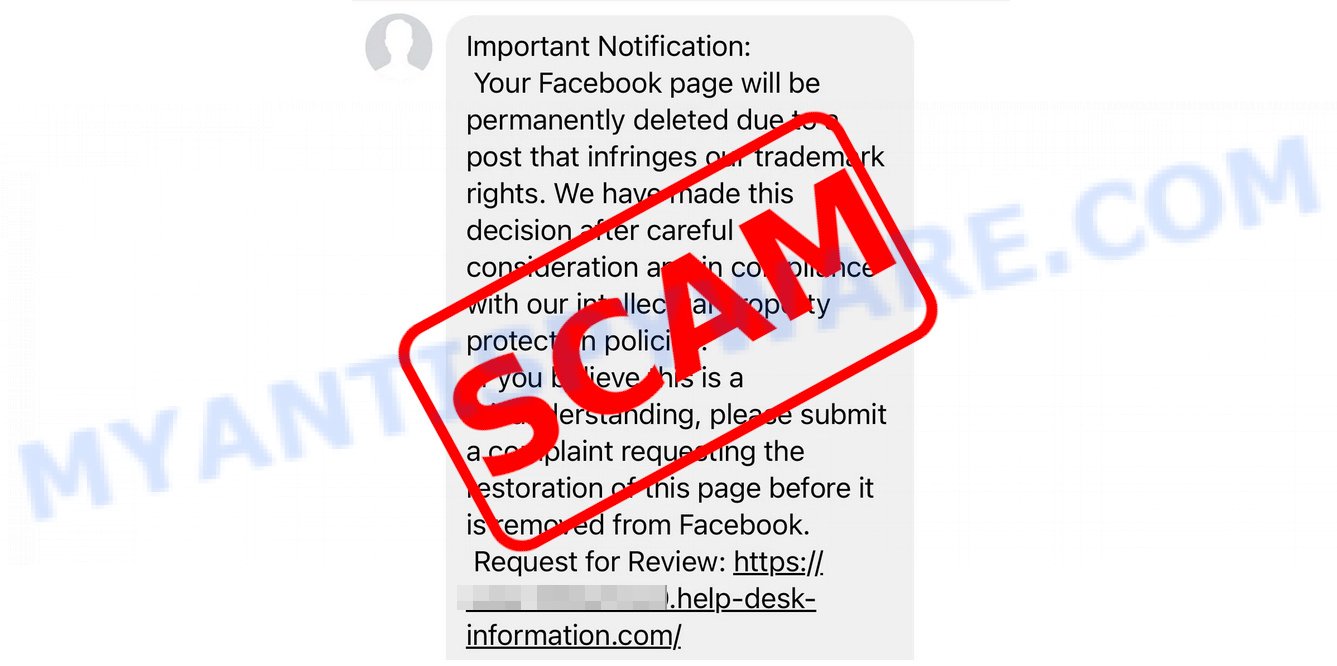
The “Your Facebook page will be permanently deleted” notification, despite its official look, is a deceptive phishing attempt. ❗Remember, real companies, especially large ones like Meta, don’t ask for personal details or account verification through unsolicited emails or messages. Read on to find out how to recognize such scams and protect your account.
Table of Contents
🚨 Is the “Your Facebook Page Will Be Deleted” Notice Legitimate?
NO, the “Your Facebook page will be permanently deleted due to a post that infringes trademark rights” notification is a Scam! 🚫. If you’ve received a message appearing to be from a “temporary support agent from Facebook”, exercise extreme caution. These messages are not from the official ‘Meta Platforms, Inc.’ and are aimed at creating panic and urgency.
The scam message typically reads:
Important Notification:
Your Facebook page will be permanently deleted due to a post that infringes our trademark rights. We have made this decision after careful consideration and in compliance with our intellectual property protection policies.
If you believe this is a misunderstanding, please submit a complaint requesting the restoration of this page before it is removed from Facebook.
Request for Review: https://case-93614712.help-desk-information.com
We understand that this may impact your current business objectives. If we do not receive a complaint from you, this will be our final decision.
Thank You,
This is a message from a temporary support agent with support id 78844890, please visit the link above and follow the instructions.
© Noreply Facebook. Meta Platforms, Inc., Attention: Community Support, 1 Facebook Way, Menlo Park, CA 94025
The fraudulent links (like “case-93614712.help-desk-information.com”) embedded in these messages lead users to fake websites that closely resemble the actual Meta platform. 🚨 The objective? To deceive you into giving away sensitive information, including login details, personal data, and sometimes even photos of your ID. Always remember: real platforms like Meta rarely send unsolicited messages demanding immediate action or personal information. Protect yourself and always double-check before taking any steps. 🛡️
🚩 Red Flags to Watch Out For:
Be cautious if you encounter these warning signs, and confirm the authenticity of the message via official channels before acting. 🔍🛡️
- 📧 Unofficial Sender Name: A vague sender name like “temporary support agent from Facebook” does not align with Meta’s official communication style. Official messages from Meta would use recognizable and direct sender names.
- 🔗 Suspicious Links: The message includes links to external sites such as “case-93614712.help-desk-information.com”, not authentic Meta or Facebook domains. Always check the link’s destination before clicking.
- ⏳ Urgency Tactics: Genuine platforms rarely use scare tactics. The message applies pressure by using terms like “permanently deleted” and “urgent response required”. It’s a tactic to prompt hasty actions.
- 🆔 Requests for Personal Information: Be skeptical of unsolicited messages asking for detailed personal data, particularly demands to upload IDs. This is not a standard procedure for account verification.
- ✍️ Grammar and Language: Phishing messages might contain noticeable grammatical errors or odd phrasing. If the language or format seems off, it’s a potential red flag.
- 🚫 Lack of Personalization: The scam message is usually generic and doesn’t address you by name or reference your specific Facebook page. Authentic notifications typically include personalized details.
- 🔄 Excessive Verification Steps: The scam involves several steps designed to gather as much information as possible. While verification is common, complex procedures initiated via unsolicited messages are suspicious.
🕵️♂️ How the Scam Works
The ‘Your Facebook Page Will Be Deleted’ Scam is a cleverly orchestrated fraud, exploiting users’ trust and urgency to address what seems like a critical issue. Understanding how this scam operates is crucial in safeguarding yourself from becoming a victim. 💡🔐
🚨 Initial Panic
Upon receiving the message claiming that your Facebook page will be deleted due to a trademark rights infringement, many page owners feel immediate stress and alarm, worried about losing their online presence and customer interactions. This is exactly what the scammers rely on. The message’s official-like tone, along with the dire warning of “permanent deletion of your page”, is crafted to induce panic, leading users to hastily click on the included links without questioning their authenticity.
🔗 Phony Links
The message cleverly contains links such as “case-93614712.help-desk-information.com”, which may appear official at first glance but are actually fraudulent. These domains have no association with the real Meta or Facebook platforms. Their primary goal? To guide users to bogus websites that closely resemble the genuine Meta interface, thus trapping them in the scam. It’s important to remember: legitimate communications from Meta would use recognizable domains like “facebook.com” or “meta.com”.
VirusTotal flagged “help-desk-information.com” as phishing and malware:
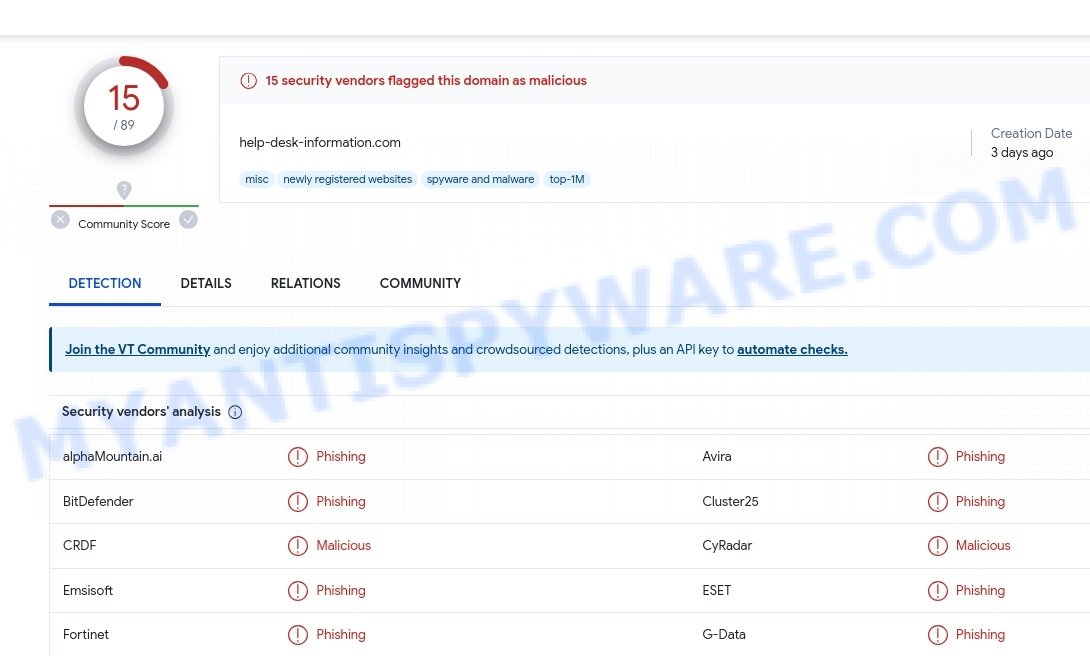
🎭 Mimicry
Once users click on the deceptive links, they’re led to sites that are startling replicas of the Meta Business interface. Every detail, from logos to fonts and even the page layout, is crafted to mirror the official platform. This mimicry serves a singular purpose: to convince users they’re on a genuine Meta page. In reality, every piece of information entered here—logins, personal data, or ID photos—goes directly into the hands of scammers.
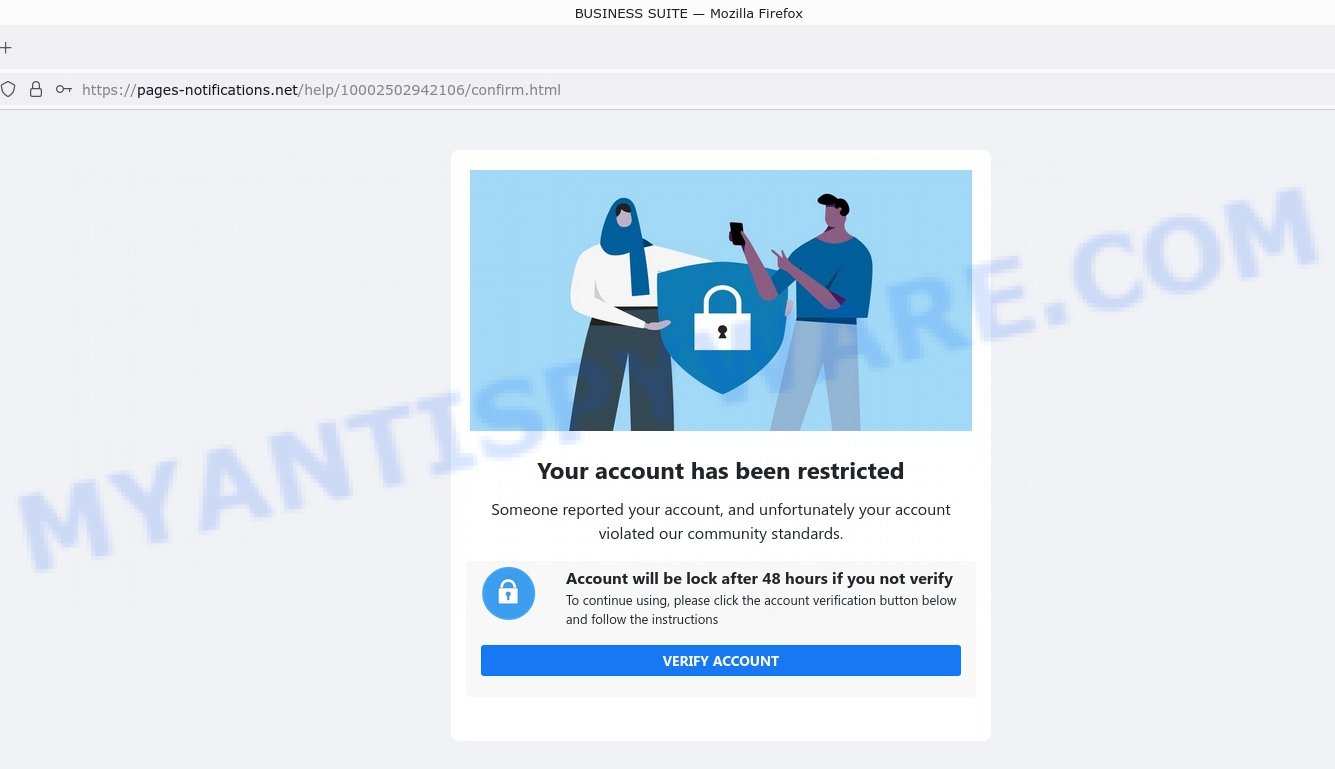
📥 Data Harvesting
When a user clicks on the “VERIFY ACCOUNT” button, they’re prompted to enter their login credentials. This is the scammer’s primary goal: capturing your username and password.
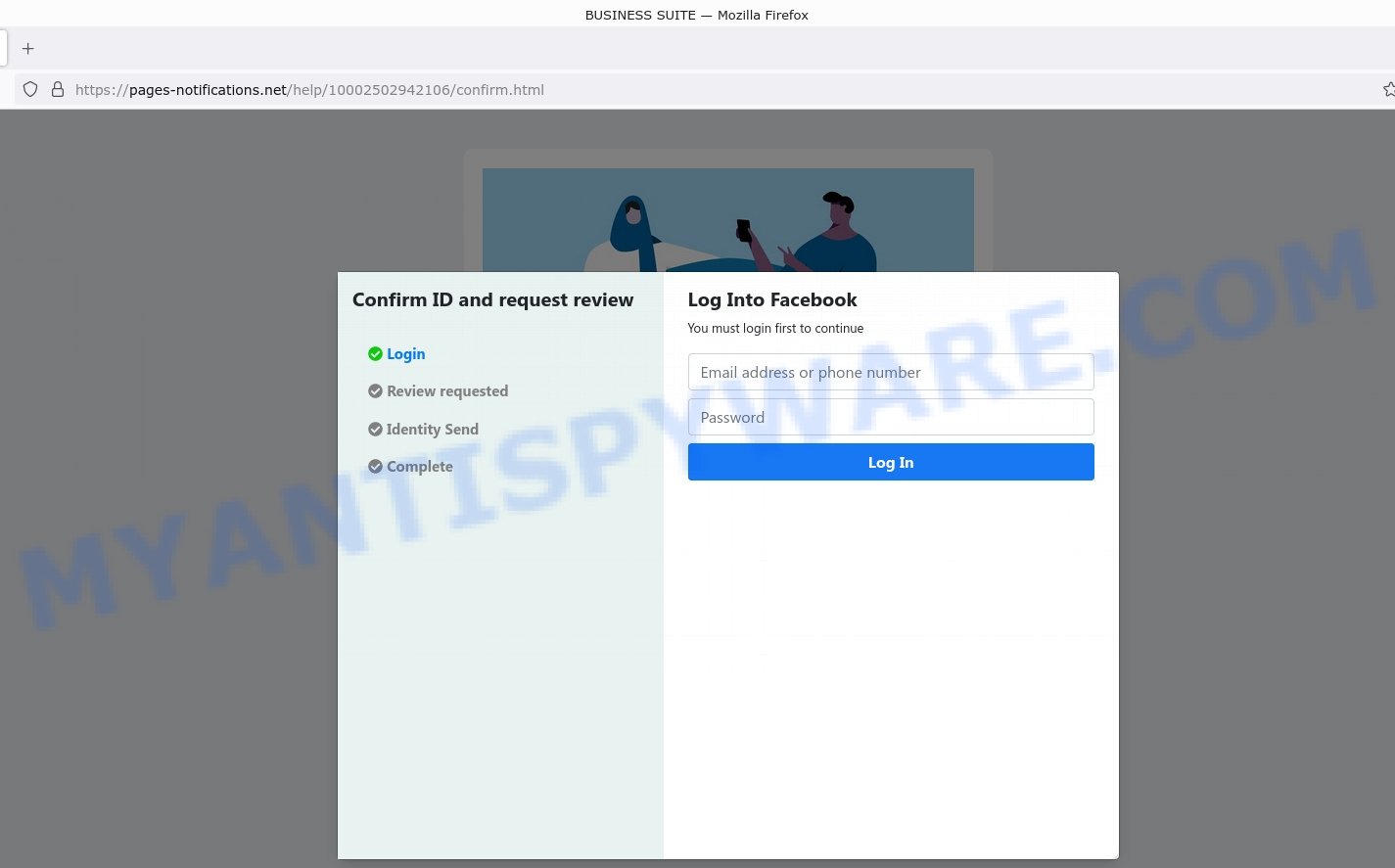
📋 More Personal Data
After obtaining login details, the scam doesn’t stop. Users are then led through a series of steps, from entering a date of birth to providing reasons for account review, further amassing data for potential misuse.
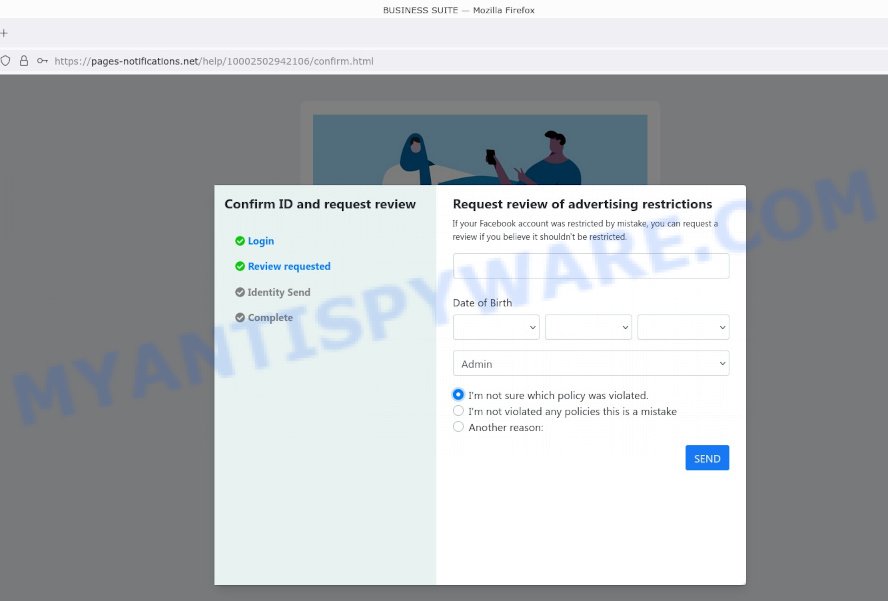
🆔 ID Theft
The icing on the cake for the scammers is when they ask users to upload a photo of their official ID. This step is particularly dangerous as it can lead to identity theft.
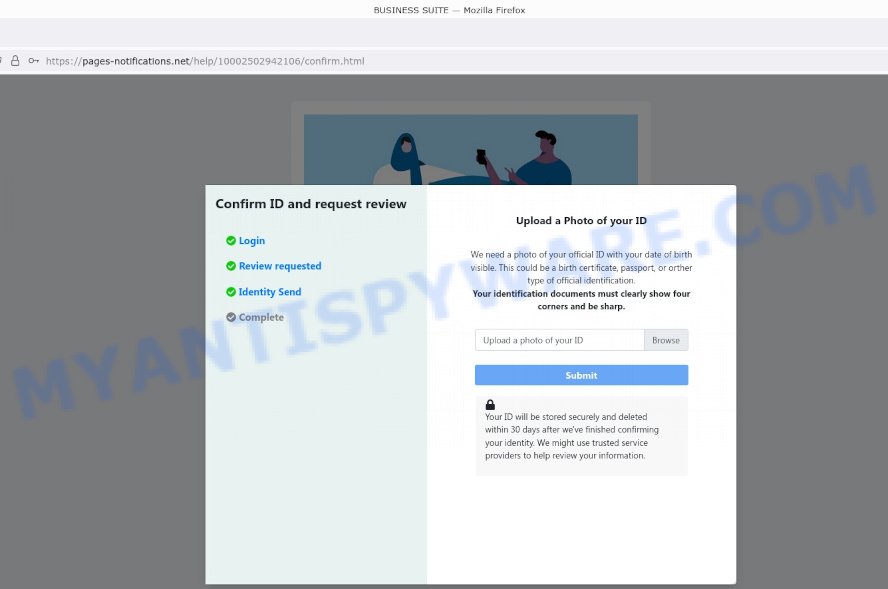
🔄 False Reassurance
After extracting the victim’s data, the fake site then offers a comforting illusion of resolution. Users are shown a “submission received” status and are assured that their so-called “review” is underway, often with a specific timeframe like 48 hours mentioned. This tactic gives victims the false belief that they’ve averted a crisis and that their accounts are safe, when in reality, the scammers have now obtained everything they were after.
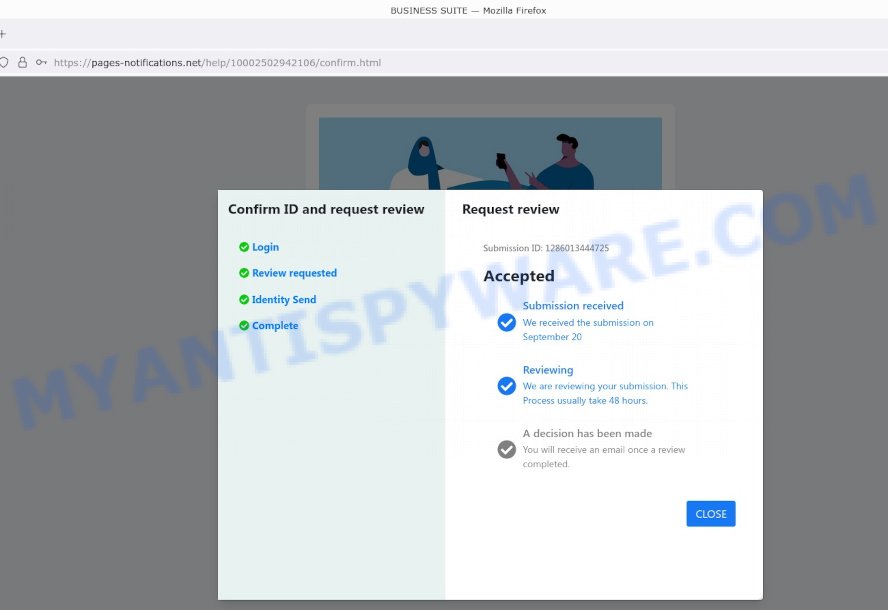
What to Do If You Receive the Your Facebook Page Will Be Deleted notice
If you’ve been targeted by the “Your Facebook Page Will Be Deleted” scam message, you’re not alone. The scam, designed to exploit unsuspecting users by posing as an authentic warning from the platform, can be unsettling. However, taking informed and prompt action can safeguard your account and personal information. Here’s a step-by-step guide on how to handle the situation effectively.
🚫🔗 Don’t Click Any Links
If you receive a suspicious message, avoid clicking any embedded links. This is the primary way scammers can lead you to fraudulent websites.
🔐 Change Your Password
Immediately update your Meta Business and other related account passwords to ensure security, especially if you suspect you’ve been compromised.
📞 Verify Through Official Channels
Before taking any action, reach out to Meta’s official support channels or check their official website for any known issues or alerts.
🚨 Report the Scam
Forward the message or provide details of the scam to Meta’s official reporting channels, phish@fb.com. This helps them be aware and possibly take action.
👥 Educate Your Team
If you run a business, make sure your team knows about the scam so they can also be on the lookout and avoid falling prey.
🔒 Two-Factor Authentication
Enable two-factor authentication for an added layer of security on your accounts, making it harder for unauthorized users to gain access.
📰 Stay Updated
Regularly check for news or updates on common scams and phishing tactics to always be one step ahead of cybercriminals.
Examples of such scams
Scams using emotional manipulation and fake news are unfortunately common tactics used by cybercriminals to exploit people’s vulnerabilities and steal money or personal information. The “Your Facebook Page Will Be Deleted” scam is just one example of such schemes. These scams often rely on shock value or sensational claims to get people to click on a link or provide sensitive information. Below are some other examples of similar scams to watch out for.
📧 Facebook Account Recovery Code Email Scam
Victims get an email claiming to be from Facebook Support, stating that they’ve requested a password reset. The email contains a “recovery code” and prompts users to confirm their identity by clicking on a provided link.
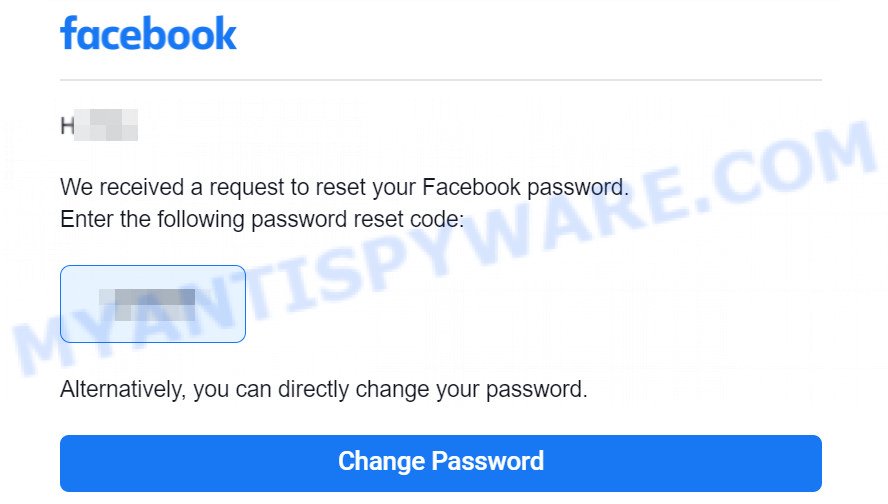
📊 Meta Business Support Scam
Users are targeted with messages that appear to be from “Meta Business Support”, claiming that a user’s page has been disabled due to intellectual property violations. The scammers then prompt users to click on a link to “resolve” the purported violation.
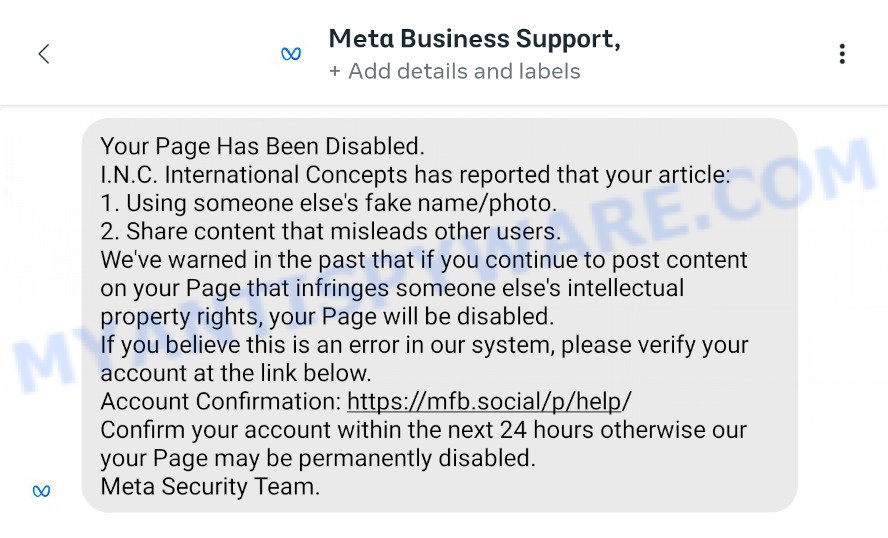
🚫 ‘We Added a Restriction to Your Account’ Scam
This scam alarms users with a notification stating that a restriction has been added to their account due to a breach of community standards. They’re urged to click on a link to lift the restriction.
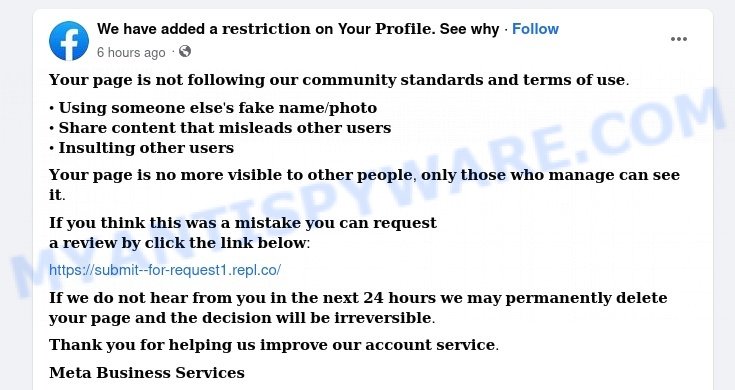
How to Report a Scam on Facebook Messenger?
Encountering the “Your Facebook Page Will Be Deleted” scam on Facebook Messenger can be alarming, but it’s vital to take action. Not only does reporting the scam protect your account, but it also aids Facebook in safeguarding the entire community from such threats. If you’ve stumbled upon this deceptive message, here’s a comprehensive guide to ensure you respond effectively and notify the platform promptly.
- Open the conversation with the sender of the message or the conversation where the message was sent.
- Click on the name of the sender of the message to open their profile.
- Click on the “Report” link or button located below the sender’s name.
- Choose the option that best describes the scam message, such as “Scam or fraud” or “Spam”.
- Follow the prompts to provide more information and complete the report.
By reporting suspicious activities, users play a pivotal role in enhancing the platform’s safety, making it less conducive for scammers to operate.
Summary table for ‘Your Facebook Page Will Be Deleted’ Scam
| Name | Your Facebook Page Will Be Deleted Scam, Fake Facebook trademark infringement notice |
| Type | Phishing Scam |
| Damage | Loss of personal data, potential account hijacking, financial loss |
| Distribution | Facebook Messenger |
| Tactics | Impersonation, fear, urgency, fake support agent |
| Scammers websites | case-93614712.help-desk-information.com, supportgroup-metaid2451-2d12d.web.app, case-231561371.affiliatemanagerhelp.com, other similar fake domains |
| Prevention Tips | Verify message authenticity, avoid clicking on unexpected links, enable two-factor authentication, regularly update passwords, be skeptical of urgent requests for action or information. |
| Reporting Info | Report to Facebook through official channels, inform local cybersecurity authorities |
😱 Steps to Take If You’ve Been Tricked by the Your Facebook Page Will Be Deleted Scam
It’s a sinking feeling to realize you’ve been tricked by the ‘Your Facebook Page Will Be Deleted’ Scam. This scam tricks Meta and Facebook users into thinking there’s a problem with their account. If you think you’ve clicked on one of these fake messages, don’t panic. We’ve got a clear and easy list of steps to help you set things right. Let’s get started.

🔐 Immediate Password Change
First and foremost, access your Meta Business and Facebook accounts to update passwords. If you used similar passwords elsewhere, change those too.
👀 Monitor Account Activity
Keep an eye on your Meta and Facebook accounts for any unusual or unauthorized activity. Scammers might attempt to misuse your account or impersonate you.
📞 Contact Meta/Facebook Support
Reach out to the official support channels of Meta and Facebook. Inform them of the scam and provide any relevant details. They might offer guidance or take measures to protect your account.
🔒 Enable Two-Factor Authentication
Turn on two-factor authentication for your Meta and Facebook accounts. This ensures an added layer of security, even if the scammers try using your old credentials.
🚫🔗 Inform Your Network
Alert your business contacts, friends, and followers about the scam. Let them know not to trust any unusual messages or requests coming from your account.
📝 Document Everything
Take screenshots and keep records of all interactions related to the scam. This might assist if you choose to report the incident to authorities or need to prove your case to platforms.
👮♀️ Report to Local Authorities
While online scams are widespread, reporting them can sometimes aid in investigations, especially if it’s a large-scale operation targeting multiple victims.
📘 Stay Educated
Make it a point to stay informed about updates on the FB copyright team Scam and similar threats. This will help in recognizing and avoiding future attempts.
🎯 Conclusion
The Your Facebook Page Will Be Deleted Scam is a cunning attempt by cybercriminals to exploit the trust users place in reputable platforms like Meta and Facebook. Leveraging panic and official-looking mimicry, the scam seeks to harvest personal data, potentially leading to identity theft and unauthorized account access.
It’s essential to remember that official communications from Meta will come from recognizable domains and will rarely, if ever, solicit personal data through emails or messages. The best defense is always vigilance and knowledge. Ensure you regularly update your passwords, enable two-factor authentication, and always double-check with official channels if you receive suspicious communications. 🛡️🌐


















I got the exact message as number one on your site. My account was indeed deleted and 6 years of data also off of The NEW Nelsonville Tribune. Is the any way to recover. Meta doesn’t give my any options that work.
Nothing is being answered!! Please help me!!